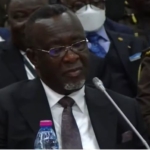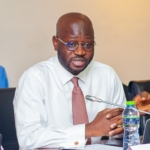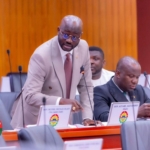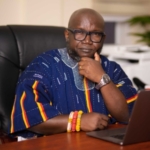
The vetting process for the next Chief Justice of Ghana was thrown into controversy today after the Minority Caucus in Parliament announced its rejection of the nomination of Justice Paul Baffoe-Bonnie and abstained from participating in the vetting proceedings.
The decision to boycott the process was announced by Minority Leader Alexander Afenyo-Markin following hours of a back-and-forth with Majority Leader Mahama Ayariga, which led to a suspension for nearly 30 minutes.
After recess, Mr Afenyo-Markin announced the abstinence of the Minority Caucus from the process as he led his side to walk out, leaving only members of the Majority side on the Appointments Committee to conduct the vetting process.
“Be it known to you, chairman, and the committee and the country that we, the Minority Caucus, hereby vote en bloc to reject the nominee. We would want to state on record that the Majority can proceed with the questions. We do not intend to proceed with any question. We are, however, registering in the strongest terms that we reject the nomination, and the records should reflect that the report of this committee be a majority report,” the Minority Leader and MP for Effutu stated.
Justice Baffoe-Bonnie, currently serving as the Acting Chief Justice, was nominated by President John Mahama to succeed former Chief Justice Gertrude Torkonoo after her removal from office.
The decision by the Minority to reject the nominee and boycott the crucial vetting session is rooted in deep-seated concerns over the process of selection and pending cases filed by Justice Torkonoo challenging her removal.
The absence of the Minority from the committee hearing means that the vetting will proceed without the cross-examination and scrutiny traditionally provided by the Minority Caucus, raising questions about the legitimacy and bipartisan support for the eventual confirmation.
Justice Baffoe-Bonnie’s Current Role and Profile
Justice Paul Baffoe-Bonnie has been a prominent figure in Ghana’s judiciary, serving as a Justice of the Supreme Court before taking on the mantle of Acting Chief Justice.
Only yesterday, at the 29th Ghana Journalists Association (GJA) Awards, he was celebrated for his role in the judiciary and delivered a stirring speech calling on journalists to uphold the principles of truth, courage, and responsibility in their work.
His ascent to the nomination was viewed by many as a logical progression, given his seniority and experience.
The confirmation of a Chief Justice requires a two-thirds majority of all members of Parliament present and voting, meaning the government will need to rely on its majority to push the confirmation through despite the Minority’s objection.
The political fracture over the nomination introduces a layer of tension and potential acrimony to the judiciary, which is constitutionally required to be apolitical and independent.
The Minority’s abstention is not unprecedented in Ghanaian politics but for the nomination of the head of the third arm of government, it underscores the intense political nature of high-office appointments.
All eyes now turn to the Appointments Committee to see the outcome of the vetting and the subsequent debate on the floor of Parliament.




